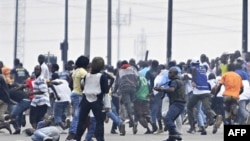A deadly standoff between two presidential candidates in Cote d'Ivoire appears to be worsening, as armed forces supporting each man clashed in the capital Abidjan and other locations in the West African nation.
At least 50 people have been killed in the skirmishing, and dozens more injured since last month's voting when the Independent Electoral Commission proclaimed former Prime Minister Alassane Ouattara as the winner. Former President Laurent Gbagbo has refused to recognize the results, despite African Union, European Union, United Nations, Economic Community of West African States and United States recognition of Ouattara as the president-elect.
The clashes last week came as military forces loyal to Gbagbo attacked protestors marching on the headquarters of Ivoirian state television, which continues to broadcast only pro-Gbagbo stories. Further protests are said to be planned against the television offices and other state institutions.
The United States is deeply concerned about the rising violence in Cote d'Ivoire, as with reports of human rights abuses and home abductions occurring. We deplore the use of violence and intimidation, which have no role in the democratic process. And we call on everyone to remain calm as the international community seeks to help resolve the political stalemate.
The United States calls on all parties to respect President Ouattara's victory in the November 28 election, which was determined credible and transparent by international observers. We join with African leaders such as Kenyan Prime Minister Raila Odinga in calling on Gbagbo to step down, for his own good and the good of his people. Faced with increasing international isolation and the implementation of economic and travel sanctions against him and his close supporters, Gbagbo must abandon his claim to the presidency and allow the choice of the Ivoirian people - Alassane Ouattara - to step forward as president.
A Call For Calm In Cote D'Ivoire

A deadly standoff between two presidential candidates in Cote d'Ivoire appears to be worsening, as armed forces supporting each man clashed in the capital Abidjan and other locations in the West African nation.



